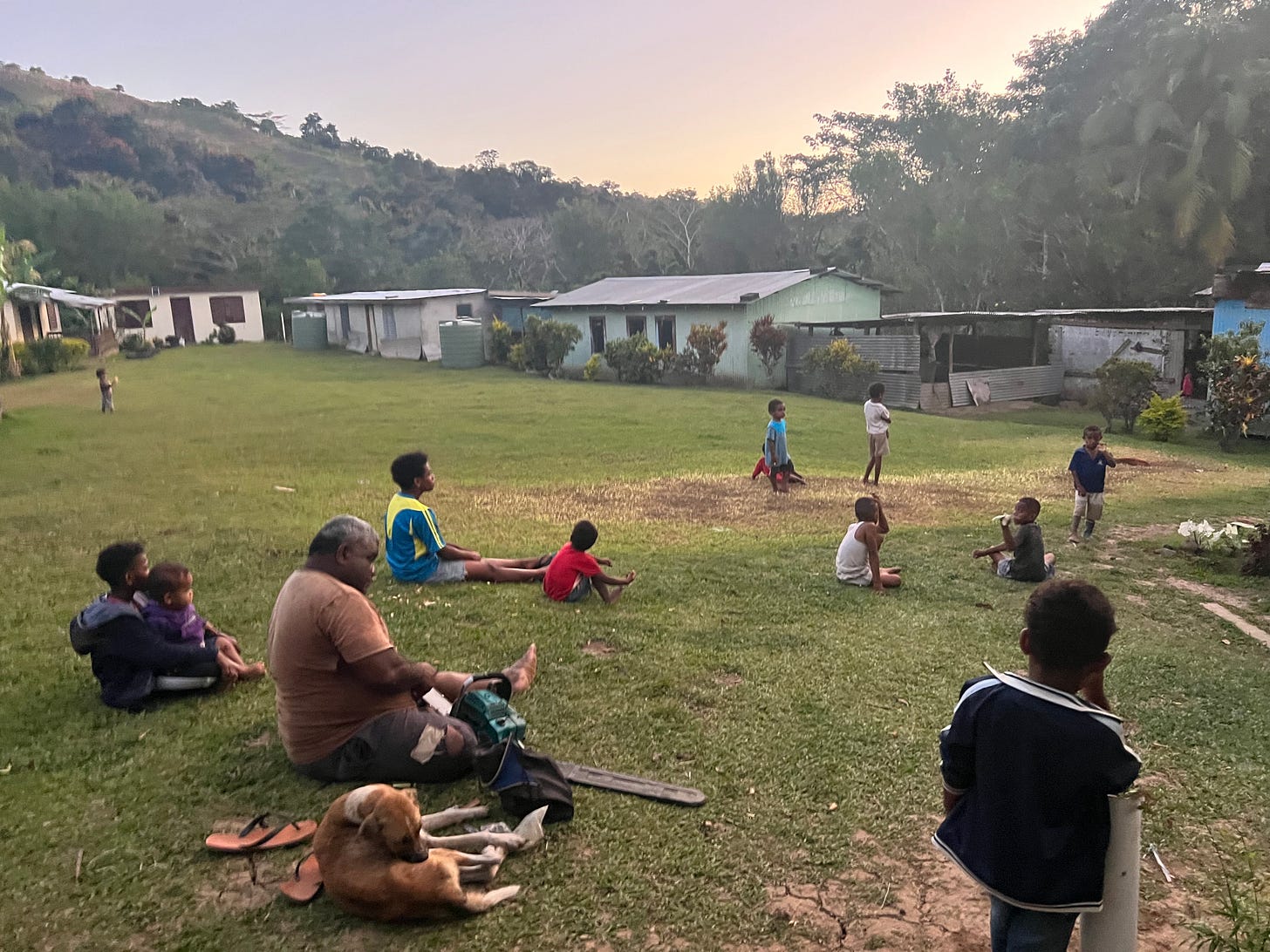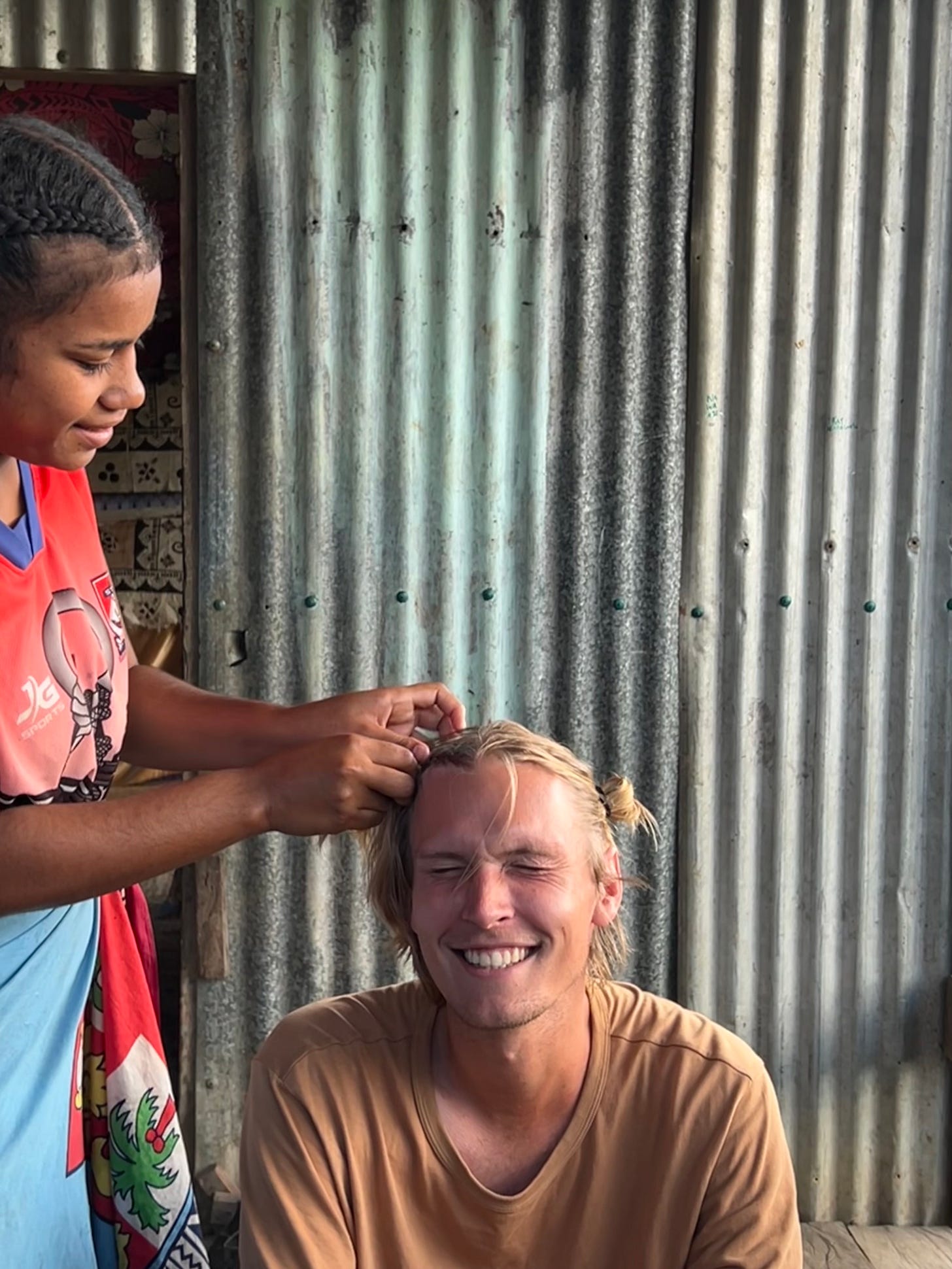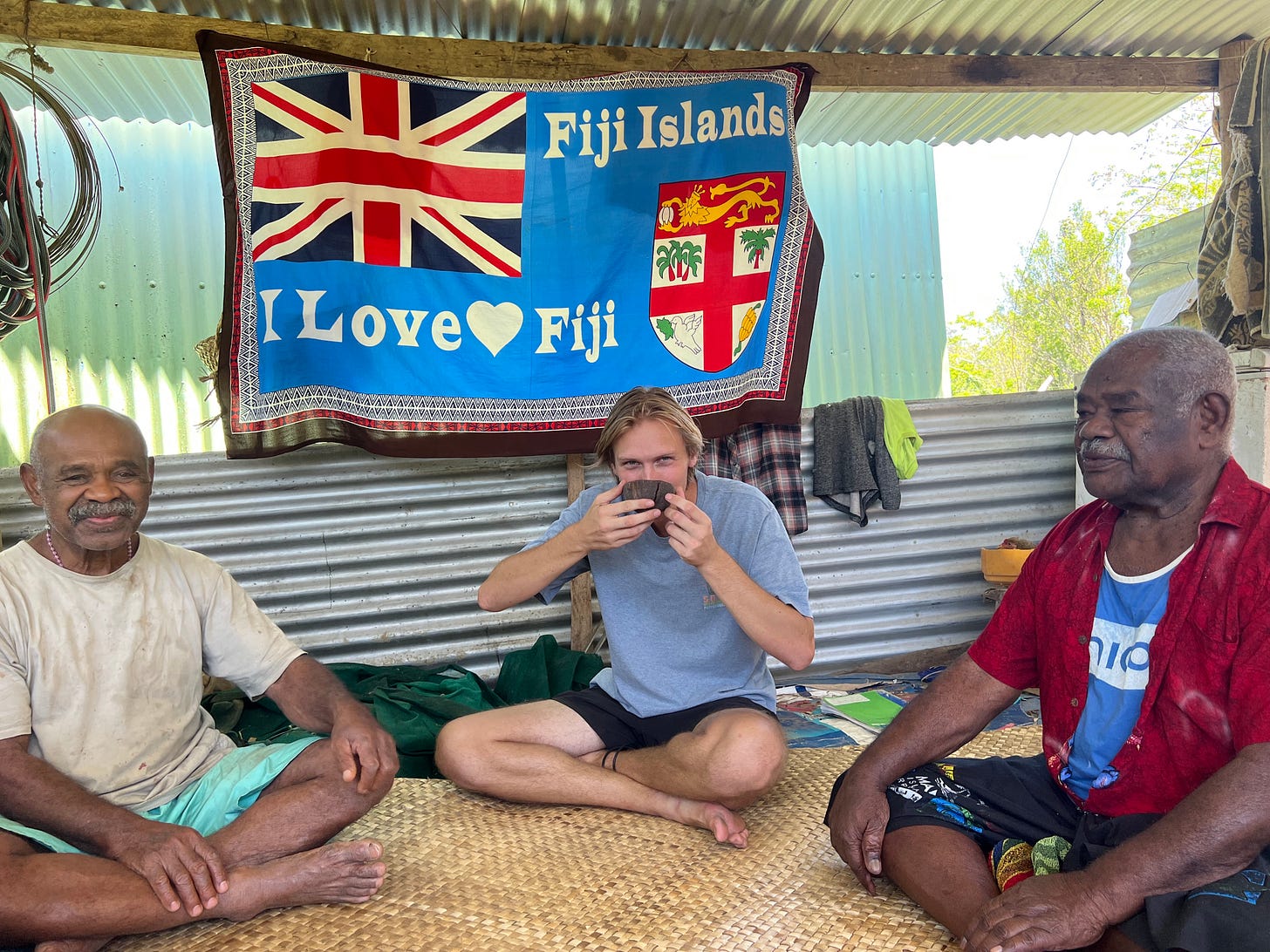If there is one thing that can sum up this past month (and more) of service, it is the Nadroga phrase Vahewa Me Rewa. This local phrase roughly means slowly but surely, and it is easily a catch-all for Fijian life and my experience in the Peace Corps. In fact, another phrase, Hai Vahewa, might do this experience more justice. Meaning a slow way of life, the people in my village argue that our region is best known for Hai Vahewa. Already, life in the Fijian village is slow compared to America. But they take great pride in saying that out of all of Fiji, we are the slowest—and I guess I’ve kind of adopted this lifestyle as well.
I like this phrase because it captures more than just daily life; it captures a mindset. Like the Italian counterparts, lo struscio and la dolce vita, it is all encompassing. It extends into professional life, into social life, and even into my personal goals of the Peace Corps. With language learning, I felt so defeated at my marginal progress week by week. I would learn new words and try to speak new phrases, but I always felt there was nothing to show for my learning. I realize now that I put hasty deadlines on my learning experience. Why rush the process? I’m still fulfilling my roles and connecting with the community, so why stress?
In this mindset shift, I have reoriented my goals around slower timelines, and I am learning to be okay with just waiting. After all, I’m going to drive myself crazy if I’m the only workaholic in the village. My host-mom says, “take it slow, don’t work too hard.” I’ll even walk to their house for tea in the morning, eat breakfast that they prepared, and then be told that it’s time to go back home and rest for a little. My friends in the village say, “relax! It’s Fiji time!”
I want to be clear…I am no frantic busy-body. I don’t know where they get the idea that I need more rest or I work too hard, because I feel like I haven't been working hard at all. In fact, many days here are reminiscent of lazy summer vacation days, and that is just the reality of Fiji living. Especially rural living. Farming is a slow process. Life needs space to grow, and I think we Americans can learn from that. The greenhouse project, a central component of my work in the village, needs time. No matter how hard I work, the seedlings aren’t growing any faster. The same extends to my friends and family in the village. People move at their own pace, and they will plow when they want to plow, sell when they want to sell, and work when they want to work. I need to remember that I came as an economic resource–not to import my own economic culture, but to help them cultivate theirs.
In other news, this past month we welcomed the new group of Peace Corps volunteers in Nadi. The new group coming marks a big step in my own Peace Corps timeline. I am now the weathered volunteer, even if the only weather I show is in my sun-bleached hair and sunburned skin. This new group almost triples my group in size, and I am excited to have new friends in Fiji. As of now, I’m the only volunteer in Nadroga province, but 6 more are coming my way in November. During the welcome ceremony, a few asked me if I’ve surfed in Fiji. Dejected, I said I had not. This floored me, as it's been 9 months, and yet I haven't paddled out once. But hold on…Vahewa Me Rewa. I need to take it slow. I’ll surf and I’ll see more of Fiji. I’ve already had a year's worth of adventures, and why rush the process?
An Ode to Tuki
Boom!
Bump..bump..bump
thump thump thump
The sound of the tchuki tattoos itself against my heart with a rhythmic basso profondo. It reverberates through the core of the village. An earthquake, a beat of deep vibrato sending shockwaves, high swells and high tides, to the most intimate corners of this valley. The initial boom is ingrained into my conscience as a consistent thump, the ticking second hand of the watch lost in the closet; the tempo that soon becomes the only sound discernible in my awareness— rather disarming as I fall into meditative trance. It’s dully audible yet acutely tangible, sending the invisible arm that will rhythmically pat me to sleep as I lay cradled in bed.
Clang!
Thump thump thump
Clang..thump..gang..thump..gang..thump
The sound of metal on metal jolts the hypnotic homeostasis the thumping generates. An inherent contradiction, yet inextricably linked—the gothic church-bell tower amidst the hollow bombs dropping. The metal rod pounding into the metal urn of the tchuki, pounding the kava root into a fine powder to be washed away into the sedated minds of its patients. The train of onomatopoeia shakes my soul.
Thump thump clang thump
Sometimes I’m there amid the action—though neither presence nor absence from the epicenter diminishes its etching on my psyche. The sun escaping behind the mountains forms a golden film haze over the green grass and banana trees. I walk towards the origin in a dream state, the rhythm complimented with the laughter of my friends who tchuki yaqona in the orange of the equatorial sun. Later tonight, as I drift asleep, the laughter will subside and only the white of their teeth will be visible in the darkness of the new moon. With no bearings, the rhythmic pulsing of the tchuki could be coming straight from the center of the earth.
Thump thump gang thump thump gang
An escalating crescendo, the troughs between waves of this beating organism quickening until all at once, one Clang! howls out into the night—and it ceases completely. The tchuki is switching hands. Pounding the kava is an exercise, and everyone needs their break between reps. This is workout. This is ritual. The marathon runner runs for ritual, earning the fruits of his labor. The ceremonial labor of tchuki promises a fruitful night of submission, a drunken state of sublime bliss. In one flexing motion, the 4 foot metal rod is lifted above his six foot solid frame—abs arms biceps triceps shoulder back poised for this divine strike from the heavens, each godly blow thumping into the earth and reverberating the dirt and concrete below. The rod is lifted back up and clangs against the metal urn. This will continue in the harshest daylight or in the dim haze of an Android flashlight.
Thump thump clang thump
The tchuki is all-encompassing, third-person omniscient. The tchuki signals a fun night. Or a slow night. A social night. A business night. A late night for sure. The tchuki is political. Grogging can be a point of contention, and the tchuki penetrates every approving and disapproving ear. The tchuki is an escape. A time to stretch from sitting cross legged. An escape from another taki of yaqona. A reprise from the function, crafting its own camaraderie of sweaty bodies out in the darkness. The tchuki is obligation. “Sometimes, you have no choice,” says one restless soul, called to action at the mercy of the village elders who want to drink. It is ubiquitous in every Fijian village.
Thump thump thump thump
Rocked to my core, my essence melds into one with this welcomed intrusion from the twilight crickets and the child-like solace of the distant laughter of adults finishing their drinks. I want to stay in this moment forever, but my mind becomes quiet and my body loosens under a warm blanket. My heart quickly finds the beat of the tchuki and falls into step. I drift away in full unison with the tempo, each thump pounding me deeper into my pillow until I’m back in Idaho, running over the concrete tube in my backyard, the wide world awaiting me right beyond my fingertips.







Declan, congrats on now being a "weathered volunteer". Kind of like the old guard welcoming in the new.
I was wondering if you'd be up for an interview? I have a PC tips and advice blog and have started interviewing PCVs from all over. If yes, you can contact me from WanderingTheWorld.com - if not, that's okay too.
Thanks for putting in the time to create these posts. Can't wait to read more.
Jim, PCV